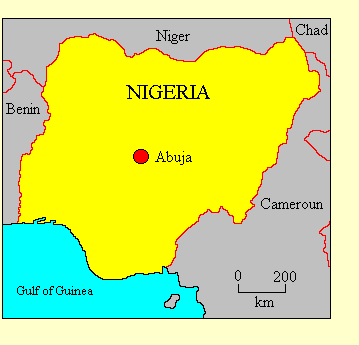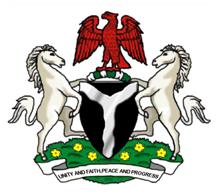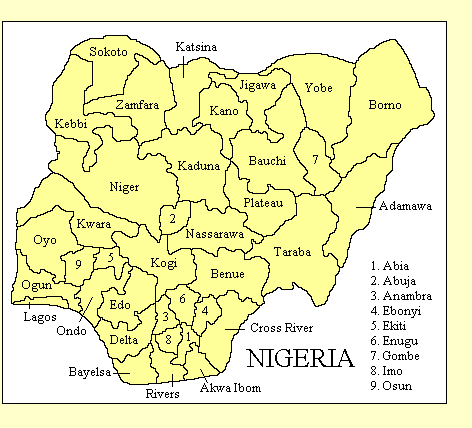

FEDERAL REPUBLIC OF NIGERIA
• Official name: Federal Republic of Nigeria
• Location: West Africa
• International organisations: African, Caribbean and Pacific Group of States, African Union,
Commonwealth of Nations, Non-Aligned Movement, Organisation of Islamic Conference, Organisation of
Petroleum Exporting Countries, United Nations, World Trade Organisation
• Borders: Benin, Cameroun, Chad, Niger
• Coastline: Gulf of Guinea
• Land area: 923,768 Km2
• Population: 154,700,000
• Annual GDP (PPP) per capita: US$2,400 (2009 CIA estimate). World ranking: 145
• Ethnicity: Virtually all Nigerians are of West African stock. The
largest communities are the closely related Hausa and Fulani (29%, dominant in the north), Yoruba (21%, in the south-west),
Igbo (Ibo, in the south-east) (18%), Ijaw (10%), Kanuri (4%), Ibibio (3.5%) and Tiv (2.5%)
• Languages: English is the official language, and is widely used
in urban areas. Hausa, Yoruba, Igbo (Ibo) and Fulani are the most
widely spoken West African languages.
• Religion: Sunni Moslem 50%, Christian (many denominations) 40%,
indigenous beliefs 10%. The Moslem population is concentrated in the
north.
• Form of government: Federal democratic republic. Nigeria is
divided into 36 states and one territory.

• Capital: Abuja
• Constitution: The new Constitution of the
Federal Republic of Nigeria was adopted in May 1999.
• Head of state: The President, elected by direct universal suffrage
for a four-year term.
• Head of government: The President, who appoints members of the Cabinet.
• Legislature: The
National Assembly is a bicameral legislature. It
consists of the House of Representatives, which has 360 members
elected from single-member districts for four-year terms, and the Senate,
which has 109 menbers, three from each state and one from the
Federal Capital Territory, also elected for four-year terms.
• Electoral authority: The Independent National Election Commission controls national elections in Nigeria.
• Freedom House 2011 rating: Political Rights 4, Civil Liberties 4
• Transparency International Corruption Index: 24% (134 of 178 countries rated)
• Reporters Without Borders Press Freedom 2010 Index: 48.5% (146 of 178 countries rated)
• Heritage Foundation Economic Freedom 2010 Index: 56.7% (111 of 178 countries rated)
Political history
The lands which now constitute Nigeria were brought under British rule
between 1861 and 1900, uniting a largely animist and (later) Christian south with
a strongly Moslem north whose cultural orientation was towards the Islamic world.
Limited self-government was introduced in some areas in 1922, and expanded in 1947.
Nigeria was granted self-government within a federal system in 1957, and independence
followed in 1960. Nigeria became a republic in 1963.
Nigeria's first Prime Minister, Sir Abubakar Tafawa Balewa, led a northern dominated
government. In January 1966 southern military officers overthrew the government,
establishing a military regime which held power until 1979. The regime was led by
Maj-Gen Yakubu Gowon, whose policies provoked the secession of the south-eastern
region known as Biafra. A three-year civil war in which up to a million people died followed.
Nigeria returned to democratic rule in 1979, when General Olusegun Obasanjo allowed
free elections and Shehu Shagari was elected President. Allegations of corruption against Shagari led to
another coup in 1983. Another 16 years of military rule followed, growing increasingly despotic and
corrupt, and Nigeria, although
possessing enormous oil wealth, was driven to bankruptcy and international isolation.
Another attempt to restore democratic rule was aborted in 1993.

Following the death of the military ruler Sani Abacha in 1998, there was
a return to civilian government. Olusegun Obasanjo, the former military ruler, was
elected President in 1999. The new constitution tries to solve Nigeria's basic
political problem, the incompatibility of the Christian south and the Moslem north,
by requiring that presidential candidates demonstrate support in both parts of the
country.
Nigeria has also tried to prevent sectional conflict by requiring that
political parties be nationally rather than regionally based. This has produced a
rather artificial party system, with parties mostly representing personal interests
and with corruption endemic. The main parties are the
People's Democratic Party (PDP), the
All Nigerian People's Party (ANPP) (which despite
its name is based largely in the Moslem north), and the
Action Congress (AC), a recent split-off from the PDP. Obasanjo
retired in 2007 and was succeeded by the
PDP's candidate, Umaru Musa Yar'Adua, in elections which
were widely regarded as highly corrupt. Yar'Adua died in May 2010 after a long illness. The Muslim president was succeeded by his Christian
Vice-President Goodluck Jonathan, who won a term in
his own right at presidential elections in April 2011. At the same time legislative elections were held, at which the PDP's
majority was reduced. These elections were less violent, better run and less corrupt than those of 2007.
Freedom House's 2011 report on Nigeria
(which was written before the 2011 elections) says: "Nigeria is not an electoral democracy... The International Crisis Group
found that the 2007 general elections, "in the view of Nigerians and the many international observers alike, were the most
poorly organized and massively rigged in the country's history." Civil society organisations reported numerous, widespread
incidents of political harassment and violence surrounding the elections in six Niger Delta states, with the majority
committed by PDP supporters or criminal gangs acting on behalf of PDP politicians... [Subsequently] the PDP enacted reforms
in 2010 to combat cronyism and favoritism within the party, and the run-up to the 2011 elections featured a variety of
viable candidates. Moreover, the appointment of a new, reputedly independent chairman to the INEC served to address
opposition complaints that the commission had effectively been an extension of the PDP... Corruption remains pervasive
despite government efforts to improve transparency and reduce graft. The Economic and Financial Crimes Commission (EFCC), the
country's main anticorruption agency, often faces politically motivated meddling... Freedom of speech and expression is
constitutionally guaranteed, and Nigeria has a lively independent media sector... Religious freedom is guaranteed by the
constitution, though many Nigerians, including government officials, discriminate against adherents of other religions...
Freedoms of assembly and association are generally respected in practice. However, protests are often suppressed by state
and private security forces... The higher courts are relatively competent and independent, but they remain subject to
political influence, corruption, and inefficiencies."
Updated November 2011
|


